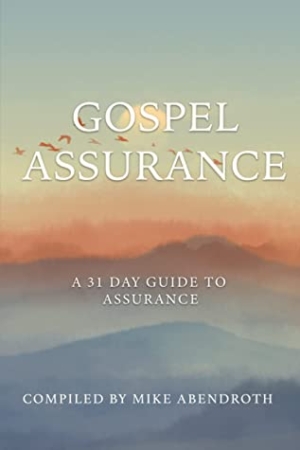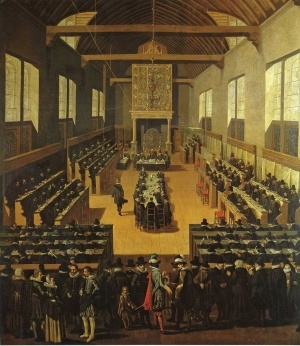Joel asks, “Is it possible for a person to want/desire to know Christ as his/her Savior and not be among the elect?” HC 21. What is true faith? True faith is not only a certain knowledge whereby I hold for truth all . . . Continue reading →
Assurance
Why Reformed Folk Become Lutheran
Over the years I have watched a trickle of Reformed folk leave confessional Reformed churches for confessional Lutheran churches and in every case of which I know there was one reason: assurance. In Lutheranism, those folk found a clear, unequivocal message of . . . Continue reading →
Getting The Gospel Right: The Heidelcast, The Pactum Podcast, NoCo Radio, And Theocast
This is a special episode of the Heidelcast recorded together with my friends Mike Abendroth, from No Compromise Radio, Pat Abendroth and Mike Grimes from the Pactum Podcast, and Jon Moffit and Justin Perdue of Theocast podcast. We gathered last Friday evening . . . Continue reading →
Heidelminicast: Covenant Theology Gives Us Assurance Of Salvation
These are some of our favorite Heidelquotes. Something to think about from the Heidelcast. If you are subscribed to the Heidelcast or the Heidelblog (see below) you will receive these episodes automatically. All the Episodes of the Heidelcast How To Subscribe To Heidelmedia . . . Continue reading →
New In Print: Gospel Assurance: A 31 Day Guide to Assurance
Christians often ask great questions about the doctrine of assurance of salvation: What is assurance of salvation? Do you know that you are going to heaven when you die? Is Assurance possible in this life? Can a Christian temporarily lose their . . . Continue reading →
Heidelcast For July 17, 2022: Every Tribe, Tongue, And Nation (8): First Head Of Doctrine (5)
In this episode Dr Clark continues his series on the the Canons of Dort where we are looking at the First Head of Doctrine of the Canons of Dort, articles 12 and 13. The Synod was responding to the problem of assurance. . . . Continue reading →
Witsius On Aspects Of True Faith
A True faith in God through Jesus Christ is the principal act of that spiritual life, which is begun in the elect by regeneration, as well as the fountain head, from whence, all those living works which follow after regeneration, proceed: the . . . Continue reading →
What Is Assurance?
During the darkest moments of our lives—when it feels we’re taking more delight in sin instead of Christ—where should we turn for the assurance of our salvation? All believers struggle with this at times. Even John Calvin said he could not “imagine . . . Continue reading →
New Resource Page: On The Assurance Of Salvation
One of the animating forces that drove the Reformation was problem and doctrine of assurance. In the medieval church (as in the Roman communion and in some Protestant quarters today) it was ordinarily impossible for a Christian to have confidence that he had been saved and was accepted by God. Tragically, one finds this sort of approach among some evangelicals and even among some ostensibly Reformed writers. Continue reading →
Calvin As Theologian Of Comfort
Wikipedia, that ubiquitous source of unimpeachable scholarship, defines “consolation” as “something of value, when one fails to get something of higher value….” That is precisely the opposite of what John Calvin (1509–64) meant by “consolation.”For Calvin, the consolation that Christ gives to his people, by the gospel, through the Spirit, is not second prize but to be valued above that which we lost. When we consider Calvin, “consolation” might not be the thing we first associate with him. The dominant perception of Calvin in our culture is that of a tyrannical, dyspeptic fellow, who delighted in nothing more than to dispatch a few heretics to the flames before breakfast. That caricature, however, was one drawn by his enemies during his lifetime and sadly, despite the facts, it has stuck for a variety of reasons. Continue reading →
Christ Is The Firm Foundation For Your Assurance
I would fain leave every one of you upon a good bottom, built upon the rock, that ‘sure foundation,’ Isa. xxviii. 16, which will stand firm and steady in all winds and weather, having that anchor-hold which will abide under all storms. . . . Continue reading →
Why The Marrow Still Matters: Recovering The Reformation
The Marrow of Modern Divinity was regarded by the orthodox Reformed, in the 17th century, as a good summary of the orthodox view of law and gospel, justification, sanctification, and the third (normative) use of the law in the life of the Christian. . . . Continue reading →
When It Comes To Assurance The Equation Stops With Christ
When it comes to assurance, the equation stops with Christ. Did he finish the work? Is he enough? You will NEVER (yes, I’m raising my voice a bit) achieve the sanctity you want without first trusting in the sufficiency of the finished . . . Continue reading →
Canons Of Dort 33: The Grace Of Perseverance Is A Spiritual Doctrine
The Reformation gospel of salvation by grace alone (sola gratia), through faith alone (sola fide), as defined and confessed by the Reformed churches and as rejected by the Remonstrants (Arminians) was intended to produce and had the effect of giving comfort to . . . Continue reading →
Canons of Dort (32): Our Sovereign God Uses Means To Encourage Us
For perhaps 20 years we have been in the midst of a movement which Collin Hansen (2008) described as Young, Restless, and Reformed. Others have spoken of the “New Calvinists” (see the resources below). The one doctrine that animates these movements is the sovereignty of God. For many American evangelicals it is a given that God has his opinion and we have ours. Continue reading →
On The Canons Of Dort (31): Doubts, Carelessness, and Godliness
The Remonstrants (Arminians) charged the orthodox Reformed, i.e., those who confessed the Belgic Confession (1561) and the Heidelberg Catechism (1563) sincerely (without crossed fingers) with being unconcerned about sanctification. The Remonstrants were convinced that the Reformed faith did not produce sufficient godliness. . . . Continue reading →
Canons Of Dort (30): God’s Gracious Assurance Of Perseverance
The single most frequent way to corrupt the doctrine of perseverance has been to turn it into a covenant of works. This happens regularly outside the Reformed churches. E.g., the Romanists teach that, in baptism, sins are graciously washed away, initial justification . . . Continue reading →
Canons Of Dort (25): Perservance Is Not A Covenant Of Works
In the previous essay we saw that the Reformed Churches defended perseverance by grace alone (sola gratia) against the Remonstrant attempt to deny perseverance by making grace resistible and conditional rather than sovereign and free. To see that we looked at the . . . Continue reading →
Canons of Dort (24): Synod’s Pastoral Concern For Assurance
As Bob Godfrey has well illustrated in his new book on the Canons of Dort, Saving the Reformation, the theology of the Synod of Dort was eminently pastoral. Synod was precise in its response to the Remonstrants but it was not technical. . . . Continue reading →
Calvin: Christians Should Not Fear That God Is Continually Offended By The Remnant Of Sin
And this is the reason why the author of The Letter to the Hebrews refers to faith all the good works of which we read as being done among the holy fathers, and judges them by faith alone [Heb. 11:2 ff.; 11:17; . . . Continue reading →







